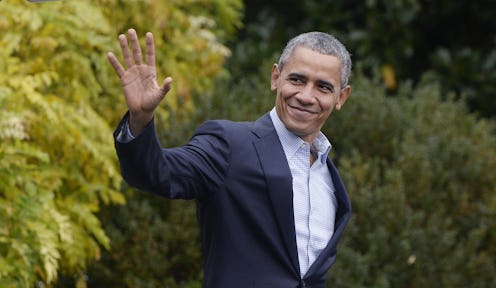News
Obama's Ready To Talk Climate Change In Paris
President Barack Obama posted a Facebook status Sunday announcing that he was leaving for Paris to attend COP21, the United Nations climate change summit. Even before the summit began, Obama got more than 180 countries to submit plans to reduce their production of environmentally-harmful emissions, according to his status. What are Obama's goals for the climate change summit? He has a long list of things he would like to get accomplished.
The overall goal for the Paris climate talks is to get every country — there are 195 attending — to submit to a legally-binding plan to keep global warming below the critical threshold, which most scientists say is 2 degrees Celsius, according to CNN. Like Obama said, more than 180 countries have already submitted plants to reduce their climate-change causing emissions, but it's unclear whether their plans are strict enough to keep that critical threshold of warming below 2 degrees Celsius. Further, that number isn't just referring to warming over the next 10 years — it refers to global warming since the Industrial Revolution. That makes the goal a pretty difficult one, since the planet has already warmed 0.85 degrees Celsius since 1880.
Scientists say that it will take serious emissions reductions to keep us from going over that 2 degree mark, because the amount of emissions that countries have already produced will "lock us in" at around 2 degrees Celsius of warming, according to CNN. Further, the countries who are most responsible for this warming will also have to do the most curbing, which is where Obama's second major goal appears.
The U.S., India, and China are the top three carbon-emitting countries in the world. Thankfully, U.S. Secretary of State John Kerry helped orchestrate and pin down a climate change agreement between Obama and Chinese President Xi Jinping, according to The New York Times. China has already agreed to the deal, so Obama's challenge won't be in hoping that they will adhere to the new emissions guidelines — it will be in hoping that the U.S. will follow the rules. Though a senior Obama administration official told CNN that Obama's ultimate goal — to reduce U.S. emissions by 80 percent by 2050 — is "ambitious and achievable," the official said he will receive a lot of pushback from climate change deniers in the Republican party.
Obama announced his domestic plans to combat climate change in August. They would shut down hundreds of coal power plants, stop the construction of new coal plants, and invest more in wind and solar power production, among other plan for renewable energy, according to The New York Times. But, while Obama's away in Paris, Republicans are planning a series of votes on his climate change plans. Also, more than half of the states are suing the administration under claims that the plan is illegal, though it's unclear just how, according to the Times. Obama has put the new plan on a tight timeline, hoping to have it finalized before he leaves office so that his successor wouldn't be able to immediately undo it.
Last, one of the more unclear obstacles Obama will face at the climate talks is how to balance environmental goals with financial restrictions. Previous meetings on climate change mandated that developed nations provide developing nations $100 billion per year to help them combat climate change while building sustainably, according to CNN. So, Obama and the leaders of other developed nations will have to hammer out just where that money will come from — will it be more privately funded or publicly funded? — and how it will be allocated.
Obama will be under pressure at home to secure a deal, but he will also face outside scrutiny. On Thursday, Pope Francis accused developed nations of having a "selfish and boundless thirst" for money that drove them to deplete and exploit natural resources and those in poverty, according to Al Jazeera. If Obama and other developed nations succeed, they will find the critical balance between helping developed nations grow sustainably and allowing their own nations to explore new paths for industrial development that doesn't harm the planet or the most vulnerable.
